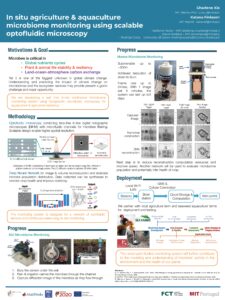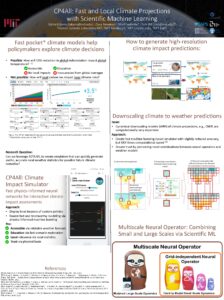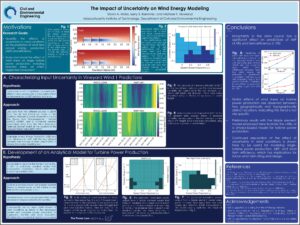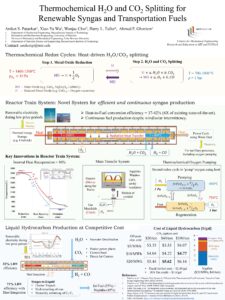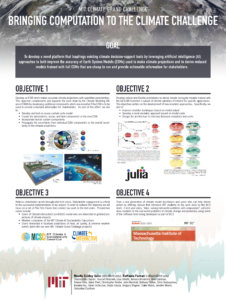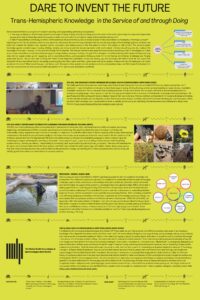2022 Annual Symposium Posters
This is a subset of posters from the symposium.
Sayandeep Biswas, Kariana Moreno, Rob Jones, Wai K. Cheng, and William H. Green
We explore different decarbonization options for long-haul trucking using a standard comprehensive framework that covers costs and emissions from well to wheel. Our technoeconomic and emissions analysis helps identify the major pain points of today’s biofuel, battery, and hydrogen productions schemes. Our analysis determines that hydrogen is a promising fuel for the future but suffers from high transportation and delivery costs. We are currently exploring Liquid Organic Hydrogen Carriers (LOHC) that benefit from being room temperature liquids. Our work focuses on developing an integrated dehydrogenation unit with a hydrogen powertrain onboard a long-haul truck. It improves upon existing LOHC supply chain by benefiting from waste heat integration on the truck, eliminating the need to compress hydrogen.
Manduhai Buyandelger, Michael Short, and Lauren Bonilla
We are trying to establish the field of Anthro-Engineering as an anthropology-led problem-solving methodology, using ethnographic and observational data to reveal the hidden boundary constraints which separate successful engineering solutions from failures in solving problems with people at their core. We focus specifically on the task of decarbonizing Ulaanbaatar, the capital of Mongolia, where many groups have tried and failed to craft a solution which stuck with the people despite the immediate, choking need to reduce coal and carbon emissions in the world’s most polluted capital city.
The MIT Environmental Solutions Initiative
Biodiversity is declining worldwide, driven foremost by the intensification in land management and the transformation of natural areas for agriculture, industrial-scale forestry production, and human settlements. Notably, most of the urban growth is often located in regions of high biodiversity and affects ecosystems far beyond urban areas, through resource demands, pollution, and climate impacts. Mainstreaming biodiversity data is a priority to improve decision-making processes that enhance the relationships between cities and the biodiversity and ecosystems that support them. We propose the implementation of a biodiversity detection and classification framework using AI and multi-stakeholder engagement to overcome urban biodiversity mapping challenges in the context of two Colombian cities located in biodiversity and carbon-rich ecosystems, namely, Quibdó and Leticia.
Charlene Xia, Katana Finlason, Stefanie Muller, David Wallace, and Rodrigo Costa
Understanding and predicting the impact of climate change on agriculture and aquaculture microbes and the ecosystem services they provide present grand challenge and major opportunity. We are developing a real time in-situ continuous microbiome monitoring system using holographic micro fluidic microscopy.
Björn Lütjens, Dava Newman, Mark Veillette, and Chris Hill
We research machine learning (ML) models that will enable decision-makers across industry and government to explore local climate risks. Our core challenge is how to reshape machine learning into fast emulators of large-scale weather or climate models while ensuring physical-consistency and trust.
Storm A. Mata, Kerry S. Klemmer, and Michael F. Howland
An overview of two projects taking place in parallel: 1. Characterizing the effect of uncertainty in data sources on predicting annual energy production (AEP) and wind farm efficiency using the Vineyard Wind 1 site as a case study, and 2. Developing an analytical model for single-turbine power production based on incident wind speed and direction over the rotor area to explain and replicate trends observed in field data.
Heidi Nepf, Megan Tyrell, Samantha Chan, and Trinity Stallins
The flow resistance provided by coastal marshes mitigates flooding by slowing storm surge and damping waves. The flow resistance (drag) provided by a marsh varies with seasonal growth, marsh loss to erosion, and marsh area gained by restoration. A quick method to measure marsh drag would enable more accurate predictions of a marsh’s impact on coastal flooding, improving coastal planning, and risk assessment. Marshes provide additional ecosystem services, such as carbon storage, habitat, and water quality improvement. Like marsh drag, these services are correlated with marsh size and spatial structure, such as vegetation type and density. A quick method to measure and monitor changes in marsh structure and vegetation health would facilitate assessment of marsh economic value and resilience. Current methods are invasive, requiring walking through the marsh, which can damage the marsh surface. A remote method would facilitate more frequent and detailed mapping without damaging the marsh.
Noelle Eckley Selin, Raffaele Ferrari, Themistokis Sapsis, Youssef Marzouk, Elsa Olivetti, Tamara Broderick, Alan Edelman, Arlene Fiore, Glenn Flierl, Christopher Knittle, John Marshall, Bethany Patten, Chris Rackauckas, Daniela Rus, Adam Schlosser, Gregory Wagner, Claire Walsh, Jennifer Morris, Sebastian Eastham
A MIT Climate Grand Challenge project, “Bringing Computation to the Climate Challenge” seeks to develop a novel platform that leapfrogs existing climate decision-support tools by leveraging artificial intelligence (AI) approaches to both improve the accuracy of Earth System Models (ESMs) used to make climate projections and to derive reduced models trained with full ESMs that are cheap to run and provide actionable information for stakeholders.
Avin Singhal, Glen P. Junor, Rafael Gomez-Bombarelli
This work explores ylides as a class of potential carbon capture molecules. We enumerate candidate molecules using cheminformatics approaches and perform high-throughput DFT calculations in order to understand the tunability of binding energy through the reactive atom center and attached heterocycle.
Joann de Zegher, Y. Karen Zheng and Yuan Shi
We study design of effective incentive systems that motivate large-scale sustainable practices by smallholder farmers. The proposed research will take a data-driven, community-centered, iterative approach to address several key questions in the incentive design: (i) identify local operational and behavioral constraints for interpretability and practical implementation, (ii) how to account for inherent uncertainty and nonlinearity in carbon measurement outcomes, and (iii) how to coordinate collective efforts by farmers as a group.
Chakanetsa Mavhunga, Tamuka Nhimatiwa, Lovemore Sekani, Ashmi Mridal, Chief Mudehwe
This poster is a summary of four applied-STS (Science, Technology, and Society) initiatives from marginalized knowledge systems to expose our students to the leading voices from these marginalized cultures, to train our students in how to work with and among these communities, and to build with them capacities to solve their own problems. These cultures of knowing have their own entrepreneurial models driven by sustainability ethics and rooted in local forms of custodianship and resource utilization. They are, very often, the first victims of ‘speed and scale,’ when big companies come in as “foreign direct investment.” A key piece in my life’s work lies in seeing these peoples and cultures not simply as victims that need our pitying conscience, but active agents that must be urgently engaged as compatriots in designing sustainable futures. This is the first time I am bringing some kind of unity to this initiative, which sees scale through trans-hemispheric dialogue. For an institute that draws the best of the best from all corners of the world, this is a great opportunity for us to design the future at-the-intersection of cultures of knowing.




